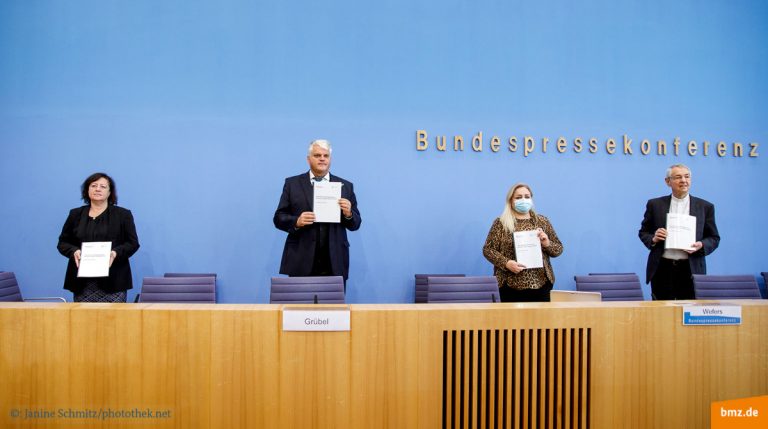Source: iran.bahai.de

On Wednesday, October 28, 2020, the German federal government published its second report on the worldwide situation of religious freedom. MP Markus Grübel, Federal Government Commissioner for Worldwide Religious Freedom in the Federal Ministry for Economic Cooperation and Development and MP Bärbel Kofler, Federal Government Commissioner for Human Rights Policy and Humanitarian Aid in the Federal Foreign Office, presented the report at the Federal Press Conference. The report covers the period 2018-2019 and contains on the one hand a transnational thematic section and a country section that specifically examines the situation of freedom of religion and belief in 30 countries.
The sectoral cross-cutting issues of the first part are violations of religious and ideological freedom through blasphemy and anti-conversion laws (1), the opportunities of digital communication and the influence of online hate speech on freedom of religion and belief (2) as well as opportunities and challenges for the Human right to freedom of religion and belief in the education sector (3).
The first chapter emphasizes that the indivisible and universal human right to religious freedom, which is standardized in Article 18 of the Universal Declaration of Human Rights and the International Covenant on Civil and Political Rights (UN Civil Covenant), also includes the right to “one’s belief to change ( conversion) or to turn away from a belief ( apostasy). An example is the case of Youcef Nadarkhani, who as a Christian convert in Iran was sentenced to death in 2010 for “apostasy” and was only acquitted in 2012 through international protest.
To interpret the term “hate speech”, the report uses the UN Action Plan to Combat Hate Speech, which is defined as “any form of communication, whether spoken, written or behavior, that attacks a person or group, or uses derogatory or discriminatory language used against a person or group on the basis of their religion, ethnicity, nationality, race, skin color, ancestry, gender or any other identification factor ”. Article 20, Paragraph 2 of the UN Civil Covenant is used, as it were, which states: “Any advocacy of national, racial or religious hatred that incites discrimination, hostility or violence is prohibited by law. The second chapter mentions “that social media belongs to the “most powerful communication instruments” of the present and are used by politicians as well as religious groups as a resource to influence opinions and initiate political action. The report states that Online platforms have “already taken measures to prevent or minimize criminal online hate speech in particular”.
In the third chapter, the report emphasizes that “a deeper knowledge of other religions can strengthen interreligious tolerance and have a positive effect on the peaceful coexistence of different religious groups and non-religious people”, while on the other hand, “educational systems support the human right to freedom of religion and belief also restrict and disrupt the peaceful coexistence of religions ”. “This applies, for example, when they promote intolerance towards people of different or non-believers and education separates religious groups from one another rather than unites them.” In addition, the education sector “is seldom more liberal than the state that organizes and provides educational offers”. The “exclusion of pupils of religious minorities from teaching, eg the Bahá’ís and other religious minorities in Shiite Iran” is cited as an example of a refusal to study that violates human rights.
In the country section, violations of religious freedom as well as persecution and discrimination on the basis of religious affiliation in Iran, among others, are presented in more detail. In particular, the situation of the Bahá’ís is considered:
“Of the non-constitutionally recognized minorities , the Bahá’ís, the numerically largest religious minority in Iran, are the most exposed to reprisals and persecution. They are generally regarded as “heretics”; they are charged with endangering the state. They are exposed to a wide range of discrimination in everyday life, including systematic persecution, from the discriminatory treatment of schoolchildren by teachers to the systematic denial of university admission as part of the state entrance examination. The Bahá’ís are not allowed to practice their faith in public, for example through church services or by wearing religious symbols. The activities of the private Bahá’í Institute of Higher Education have been banned, its leading teachers have been arrested, and teaching has been prevented several times in the past following raids, which is why it is increasingly taking place on the Internet in the style of a distance university. Compulsory measures against companies owned by Bahá’ís take place regularly (closure, license revocation, non-renewal of licenses). Discrimination against Bahá’ís continued in 2019 through arbitrary arrests, long detention periods, torture and other ill-treatment. The application form for identity cards, which has been in force since January 2020, means further discrimination against the Bahá’ís and other officially not recognized religious minorities.In the new form, only members of the officially recognized religions have the opportunity to note their religious affiliation. The officially not recognized religious minorities have to deny their religious affiliation or refrain from applying for an identity card.”
Leave a Reply